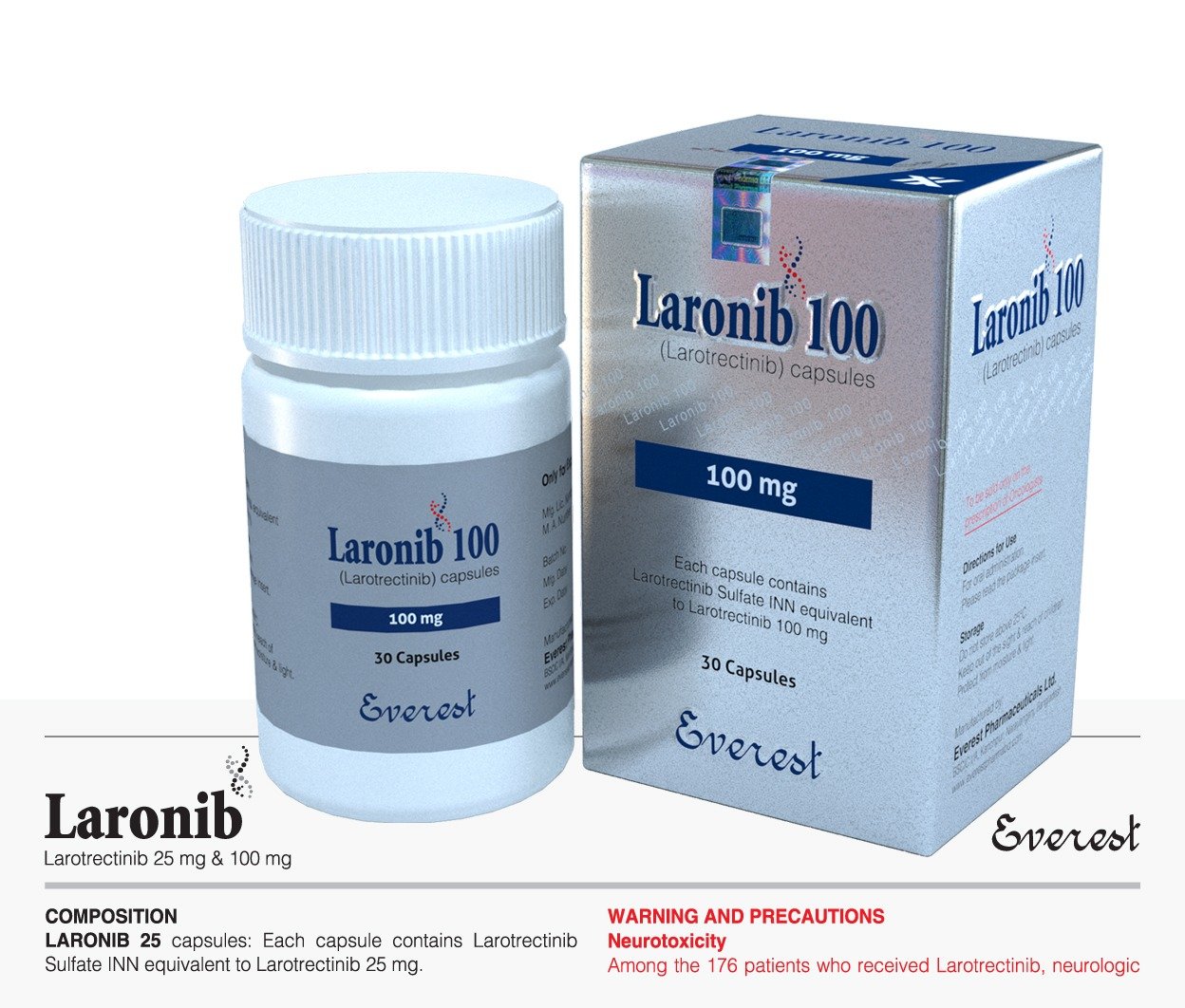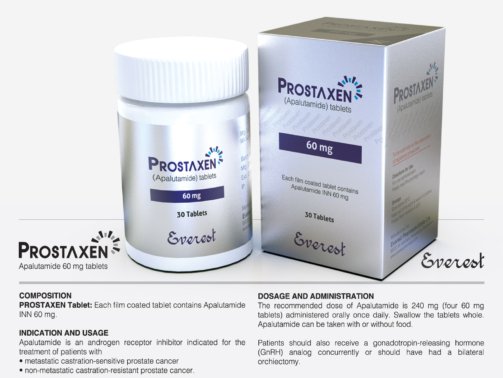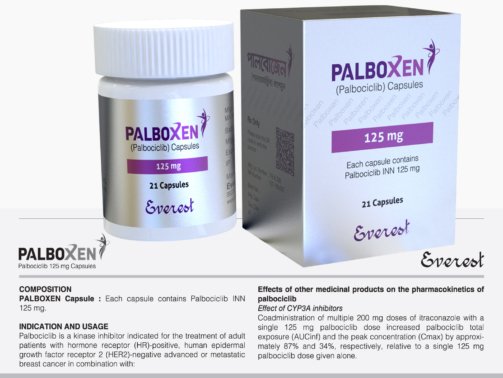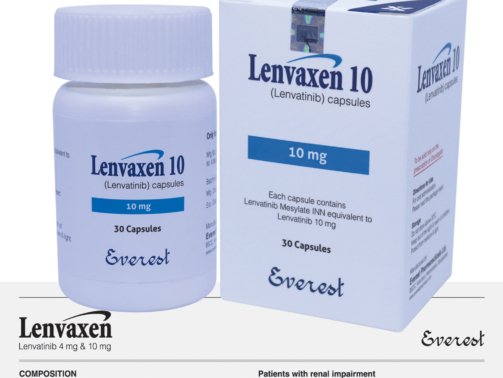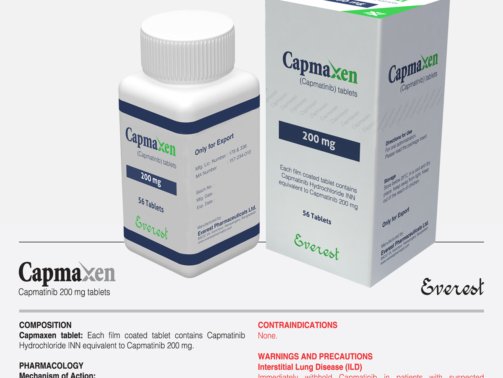Larotrectinib 100 mg
0.00$
Laronib (Larotrectinib INN) is a medication indicated for the treatment of solid tumors displaying neurotrophic tyrosine receptor kinase (NTRK) gene fusion, without known acquired resistance mutations. It is suitable for various cancer types, including pediatric patients aged one year and older, adults with NTRK gene fusion solid tumors, and those with metastatic solid tumors who have exhausted other treatment options. Operating as a tyrosine kinase inhibitor, Laronib selectively targets tropomyosin receptor kinases (TRK) A, B, and C, hindering the growth and spread of cancer cells harboring NTRK gene fusions. The typical dosage is 100 mg taken orally twice daily, with or without food, with potential dosage adjustments based on individual response and tolerance. Patients should inform healthcare providers about all medications to avoid potential interactions, and regular monitoring for signs of adverse effects such as hepatotoxicity, neurotoxicity, and embryo-fetal toxicity is recommended. In case of overdose, supportive measures are advised, focusing on symptomatic and supportive care.
Larotrectinib contains Larotrectinib, which is a targeted tropomyosin receptor kinase (TRK) inhibitor designed to treat solid tumors with a neurotrophic tyrosine receptor kinase (NTRK) gene fusion. This oral medication belongs to a novel category of targeted cancer therapies aimed at treating tumors based on specific genetic alterations, rather than their anatomical location in the body.
Larotrectinib, produced according to strict pharmaceutical regulations, is available as a capsule and is commonly used to treat both adult and pediatric patients with NTRK fusion-positive cancers. It signifies a significant advancement in precision oncology, providing hope for patients with rare or treatment-resistant cancers.
Mechanism of Action
The active component of larotrectinib functions by blocking TRK proteins (TRKA, TRKB, and TRKC) that are inappropriately activated as a result of NTRK gene fusions. These fusions can lead to unchecked cellular growth and multiplication across different cancer types. Larotrectinib selectively binds to these TRK proteins, which interrupts the signaling pathway responsible for tumor growth and effectively halts or slows cancer progression.
This mechanism enables Larotrectinib to function as a tumor-agnostic therapy, rendering it effective against various cancers that share the same genetic mutation, irrespective of their origin.
Indications and Usage
Larotrectinib is prescribed for:
Patients (both adult and pediatric) with solid tumors harboring an NTRK gene fusion and no known acquired resistance mutation.
Patients with metastatic cancer or in cases where surgery would probably lead to serious health complications.
Patients with no acceptable alternative treatments or who have progressed after previous therapies.
Common cancers that might show NTRK fusions include:
Infantile fibrosarcoma
Secretory breast cancer
Neoplasms of the salivary glands
Thyroid carcinoma
Bronchial carcinoma
Colorectal cancer
Soft-tissue sarcomas
Dosage and Administration
Larotrectinib is usually taken orally two times a day, regardless of meals. The exact dosage and treatment plan should be determined by a qualified oncologist based on:
The patient’s weight and body surface area (especially for pediatric use)
The extent of the disease
Treatment response and tolerance
Capsules must be swallowed whole and should not be opened, crushed, or chewed.
Clinical Efficacy
Across various clinical trials, larotrectinib has shown impressive response rates. The overall response rate in a pooled analysis of three clinical studies involving both adults and children was about 75%, with numerous patients attaining partial or complete remission. Significantly, these responses were long-lasting and noted across various tumor types, highlighting the effectiveness of Larotrectinib as a tumor-agnostic agent.
Side Effects and Precautions
Larotrectinib, like every cancer treatment, can lead to side effects. Frequent negative responses comprise the following:
Müdigkeit
Unsteadiness
Vomiting and nausea
Either constipation or diarrhea
Increased liver enzymes (ALT/AST)
cough
Neurotoxicity (which may involve memory impairment or mood changes)
During treatment, patients should have regular liver function tests and neurological evaluations. If serious side effects occur, it may be necessary to adjust the dosage.
Precautions should be taken in the following cases:
Pregnancy: Larotrectinib can be detrimental to a developing fetus; it is advisable to use effective contraceptive methods throughout the treatment and for a while after the final dose.
Breastfeeding: It is not advisable because of the possible risk to babies.
Pediatric Use: It has been proven safe and effective for children, which makes it one of the few targeted therapies authorized for pediatric patients.
Storage and Handling
Keep Larotrectinib capsules at room temperature (20°C to 25°C).
Shield from high levels of dampness and light.
Ensure that children cannot reach it.
Why Choose Larotrectinib?
Tumor-Agnostic Treatment: Works effectively on different tumor types that have NTRK fusions.
Elevated Response Rates: Proven notable and lasting clinical advantages.
Oral Convenience: Capsule formulation that is easy to administer.
Pediatric Approval: Safe for children with TRK fusion cancers.
Conclusion
Larotrectinib at a dosage of 100 mg signifies a novel advancement in the field of precision oncology. It offers a personalized treatment option for patients with rare and hard-to-treat tumors by focusing on the genetic basis of cancer rather than its site. Larotrectinib 100 mg, which has demonstrated effectiveness and tolerable side effects, provides a new source of hope for patients and their families dealing with TRK fusion-positive cancers.
Always consult your healthcare provider to assess whether Larotrectinib is suitable for your specific condition.
Order Now At Mdx Pharma bd….
To order from MDX Pharma BD, visit their website at https://mdxpharmabd.com, where you can browse products and place orders online. For inquiries or orders via email, contact emedicarepharma@gmail.com. Alternatively, call (+88) 01929123476. Their address is 29, Abdullahpur, Uttara, Dhaka-1230, Bangladesh.
1. What is the purpose of Larotrectinib?
Larotrectinib is utilized for the treatment of solid tumors that possess a particular genetic mutation known as an NTRK gene fusion. It is intended for patients whose cancer is metastatic or cannot be surgically removed and who lack satisfactory alternative treatment options.
2. What is the mechanism of action of Larotrectinib?
Larotrectinib serves as a TRK inhibitor. It functions by obstructing the unusual proteins generated by NTRK gene fusions, which propel cancer development. It aids in halting or slowing the tumor’s development by preventing this activity.
3. What is the method of taking Larotrectinib?
Larotrectinib should be taken orally two times a day (at 12-hour intervals), regardless of meals. Always adhere strictly to your doctor’s prescription and only adjust the dosage if you have received specific instructions to do so.
4. Is Larotrectinib suitable for use in children?
Larotrectinib is approved for use in both adults and children with tumors that are NTRK fusion-positive. In pediatric patients, dosage is determined according to the body surface area (BSA).
5. Is it safe for women who are pregnant or breastfeeding to take Larotrectinib?
Negative, Larotrectinib can be detrimental to a baby in utero or a breastfeeding baby. During treatment and for at least one week following the last dose, women should employ reliable contraceptive methods. It is not advised to breastfeed.
6. What is the maximum duration of Larotrectinib therapy?
You may keep up the treatment as long as it remains effective and is well tolerated. Regular examinations and scans will aid in evaluating the response and determining the length of treatment.
| Product Name | Laronib |
|---|---|
| Generic Name | Larotrectinib INN |
| Formulation | Capsule |
| Available Pack size | 30 Capsules |
| Strengths | 100 mg |

 Cart is empty
Cart is empty 